The 7 Best Portable Generators of 2023
Dotdash Meredith and Yahoo Inc. may earn commission or revenue on some items through the links below.
Stay prepared for everything from emergencies to off-the-grid adventures.
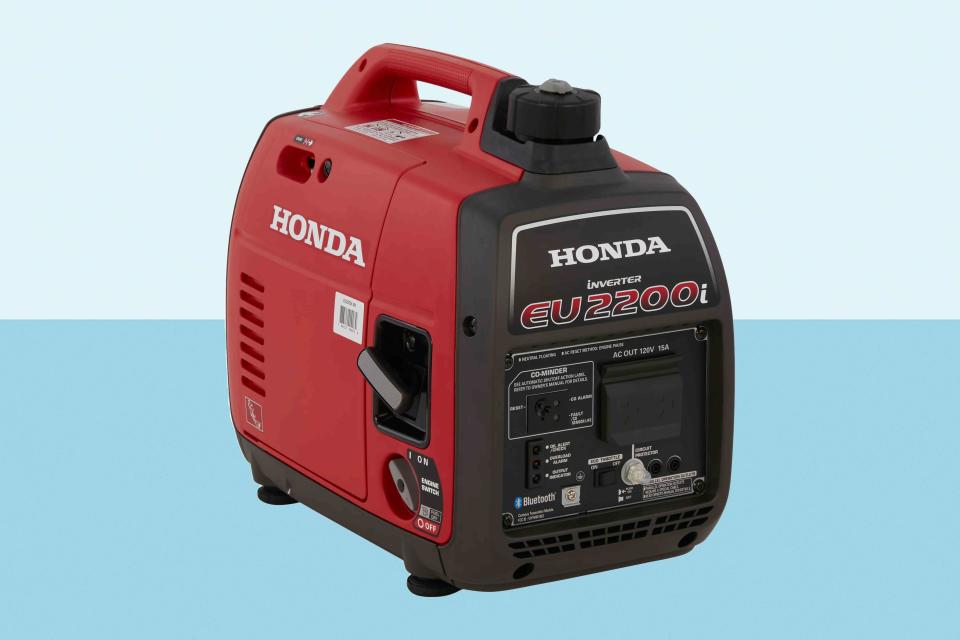
Real Simple / David Hattan
Power outages are never fun, but with a portable generator, you can keep your appliances running and lights on even after a storm or blackout. And a portable generator isn’t just limited to emergency preparation—it can also provide a steady power source for RVs, campsites, and tailgating.
“It is important to understand what you want to power/charge when picking a generator. You should look at the wattage needed and pick a generator that can handle that wattage,” says Daniel Majano, a program manager at the Electric Safety Foundation International (ESFI). “In most cases, generators should only be used to power essential devices and never plugged directly into a home's outlet. Make sure to always purchase a generator with a transfer switch or have a transfer switch installed before using a portable generator without one.”
To find the best portable generators, we researched top options and considered factors like type, wattage, fuel, size, and weight. We also spoke to Majano for his expert insight and safety tips.
Best Overall Portable Generator: Honda EU2200i 2200 Watt Portable Inverter Generator
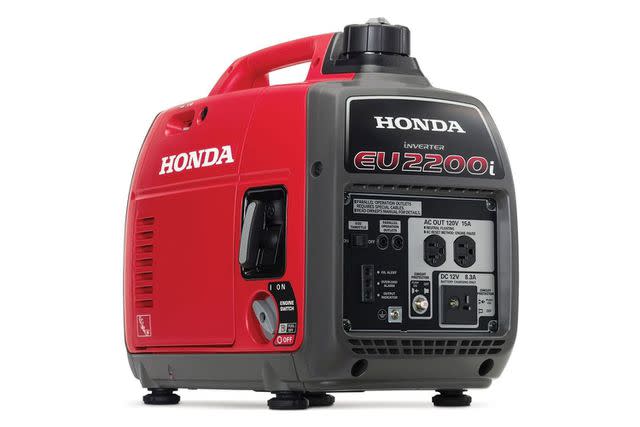
What Stands Out
This inverter generator is recommended by our experts and has Bluetooth connectivity.
What Could Be Improved
It’s expensive for a non-heavy-duty model.
If you want a compact portable generator that won’t take up too much space in the garage or trunk of your car, opt for the Honda EU2200i. This inverter generator has a 2200-watt power output and weighs just 46 pounds, making it ideal for camping or RV trips.
Because it’s an inverter generator, it creates stable, continuous power, which is especially beneficial for sensitive electronics like laptops and smartphones. It’s also more fuel-efficient compared to standard generators.
With a decibel range of 48-57, you can expect this generator to run quietly without disturbing your household or campsite. It also can run for up to eight hours on a single tank of fuel. We love the connected app that monitors and controls many functions, including remote shutoff—which comes in handy when maneuvering in an emergency without lights. Just be prepared to pay a premium for this model, as it is one of the more expensive options.
Price at time of publish: $1,199
Type: Inverter | Wattage: 2200 watts | Fuel Type: Gasoline | Size: 16.7 x 11.4 x 20 inches | Weight: 46 pounds
Best Budget Portable Generator: Wen 56235i 2350-Watt Portable Inverter Generator
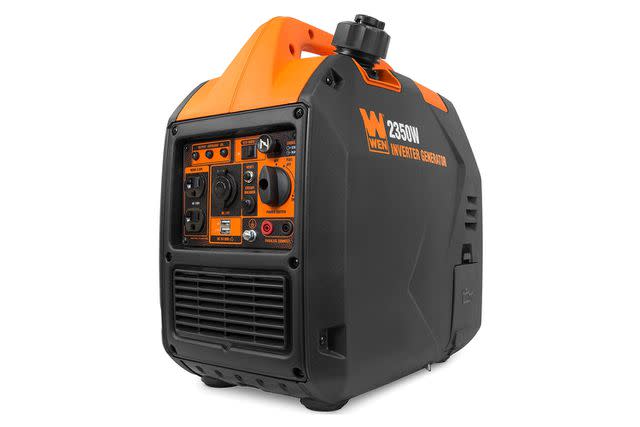
What Stands Out
It has an eco-mode switch that saves fuel by adjusting the engine intensity based on the power output.
What Could Be Improved
It doesn’t run as long as comparable generators.
The Wen 56235i is a budget-friendly option for emergency backup power at home or on the next family camping trip. At around 50 decibels, the quiet motor is barely noticeable, placing it at about the same noise level as your typical air conditioning unit.
An automatic shutoff system stops the engine once it runs out of fuel, and the built-in carbon monoxide sensors turn the generator off if they detect any harmful fumes. With a gallon of gas, you get about five hours of power on a quarter load—which is slightly shorter than other similar generators. This model has an eco-mode switch that saves fuel by adjusting the engine intensity based on the power output. Because it’s only 2350 watts, it’s probably best if you don’t use many appliances while running it. But if you need more power, you can buy another Wen generator and a parallel kit to connect them.
Price at time of publish: $430
Type: Inverter | Wattage: 2350 watts | Fuel Type: Gasoline | Size: 17.7 x 11.5 in x 17.3 inches | Weight: 39 pounds
Best Large Portable Generator: Ryobi 6500 Watt Portable Generator with CO Shutdown Sensor
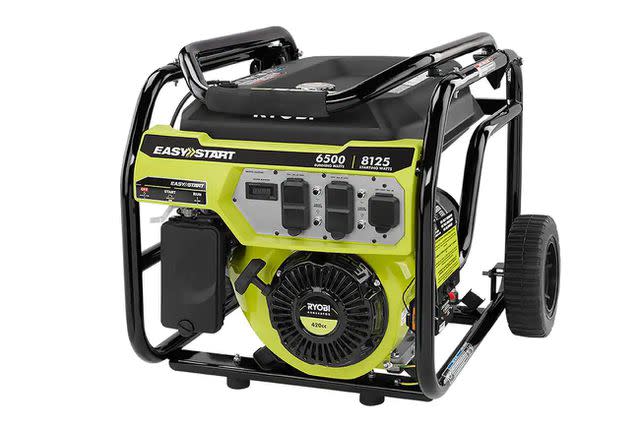
What Stands Out
It can hold six gallons, which can keep it running for up to 10 hours.
What Could Be Improved
It weighs 195 pounds, so it’s not easily portable.
During a blackout, storm, or hurricane season, you want a beast of a generator, like this model from Ryobi. Its impressive wattage keeps appliances like refrigerators, TVs, and air conditioning units running smoothly without tripping the power.
This heavy-duty machine has a sturdy handle and 10-inch wheels, so you can move it around more easily—making it especially suited for construction or job sites. Like many other portable generators, it has a built-in carbon monoxide sensor to keep you safe. It also has a range of outlets for small appliances and power-hogging items like furnaces and air compressor units. When full, the fuel tank can hold six gallons, with enough power for 10 hours.
Price at time of publish: $1,099
Type: Standard | Wattage: 6500 watts | Fuel Type: Gasoline | Size: 24.5 x 29 x 35 inches | Weight: 195 pounds
Best Lightweight Portable Generator: Champion Power Equipment 2000 Watt Portable Inverter Generator
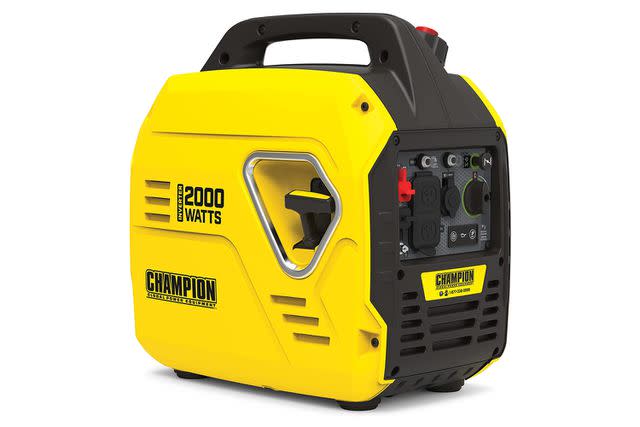
What Stands Out
It's EPA- and CARB-compliant.
What Could Be Improved
It’s not a heavy-duty generator.
If you need a backup power source you can easily lift and move, the Champion 2000-Watt Inverter Generator is worth considering. Weighing just 39 pounds, this model is not only one of the lightest portable generators on our list but also one of the lightest options you can find on the market, period.
If you don’t like loud generators, you’ll appreciate the relatively quiet 53-decibel motor, which is equivalent to running a dishwasher in another room. This generator also has a recoil start button that kicks on quickly in frigid weather.
We appreciate that this pick is EPA-compliant and CARB-compliant, which means it meets regulatory standards that are better for the environment. This portable generator is perfect for your next camping trip, RV adventure, or tailgate party, but is probably too small to be an emergency backup in a storm or blackout.
Price at time of publish: $629
Type: Inverter | Wattage: 2000 watts | Fuel Type: Gasoline | Size: 17.7 x 11.5 x 17.3 inches | Weight: 39.5 pounds
Best Dual-Fuel Portable Generator: Westinghouse iGen4500DFc 4500 Watt Portable Inverter Generator
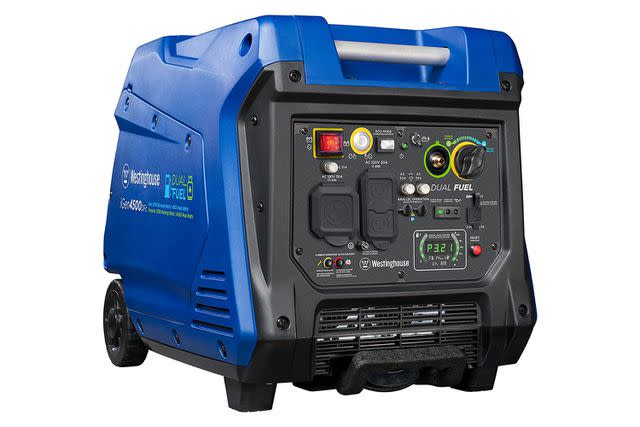
What Stands Out
It can run on gas and propane.
What Could Be Improved
It’s not very compact—or affordable.
This dual-fuel Westinghouse portable generator runs on gas and propane, so you never need to worry about being unable to find a fuel source. While you have to pay more for the propane fuel upfront, you get more out of it because it burns longer and won’t degrade as fast as gas.
This 4500-watt model provides up to 18 hours of runtime on a 3.4-gallon gas tank—and because it has an inverter, it kicks into high or low gear as necessary to save fuel. Though it weighs over 100 pounds, it comes with wheels and a plastic handle to move it around. Plus, it has an electric start and a wireless remote to turn it on.
A hard-shell enclosure, cooling fans, and mufflers make this a surprisingly quiet option at 52 decibels. The convenient digital LED screen displays essential data such as runtime, remaining fuel, load, and voltage. While this is an undoubtedly high-quality generator, it’s not the most budget-friendly option.
Price at time of publish: $1,199
Type: Dual-Fuel | Wattage: 4500 watts | Fuel Type: Gasoline, Propane | Size: 20 x 17.5 x 24.5 inches | Weight: 105.8 pounds
Best Solar-Powered Portable Generator: Jackery 1002 Watt Solar Generator 1000 PRO
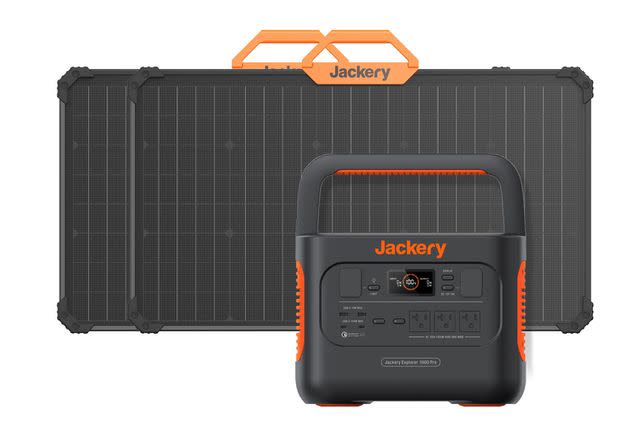
What Stands Out
At 46 decibels, it's the quietest generator on our list.
What Could Be Improved
It requires additional equipment to use, making it pretty bulky.
This generator is an eco-friendly alternative powered by the sun. It delivers 1000 watts of steady power and is best suited for outdoor camping or RVs (or anywhere you’ll be outside). You can plug in up to eight devices, including laptops, hair dryers, coffee makers, or refrigerators. And with a 46-decibel level, it’s much quieter than most traditional portable generators.
The 1000 Pro has two 80W solar panels, an AC power cord, and car charging cables. Charging it is easy—just connect it to the panels or a wall outlet, and it’ll be fully charged in under two hours. It weighs less than 30 pounds and has a foldable handle and carrying case, so you can bring it anywhere you need power.
We also like the LED light on the side with three brightness settings, so if your power goes out, you don’t have to fumble in the dark to turn your generator on. The Jackery has a long life cycle and can last up to 1000 charges. While it isn’t the most powerful option on our list, we still think this pick is handy for camping and RV trips.
Price at time of publish: $1,597
Type: Solar | Wattage: 1000 watts | Fuel Type: Solar | Size: 12.5 x 6.1 x 9.2 inches | Weight: 25.4 pounds
Best Portable Generator for Camping: DeWalt 2200 Watt Portable Inverter Generator
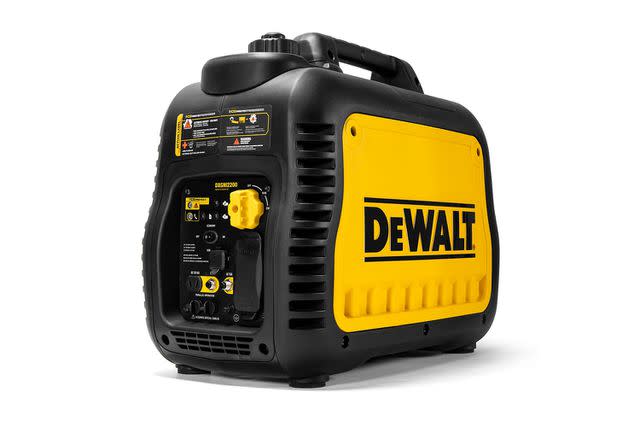
What Stands Out
It comes with USB outlets to charge your devices.
What Could Be Improved
It can’t power a lot of appliances at once.
For camping trips, RV journeys, and beyond, this DeWalt model is the way to go. You don't have to worry about using this generator on your next outdoor adventure because the outlets are covered, so they won’t get damaged in wet or snowy weather. Though, you may need more power if you have many appliances or want to use them at home during big emergencies.
This portable option has a motor enclosed in a hard case for a noise level of just 60 decibels—plus it can run for 11 hours straight on one gallon of gas, which is more than enough for a night in the great outdoors. And because it’s an inverter, it has an extra economy mode that saves fuel by automatically adjusting engine speed and noise level based on the energy load.
You can easily control the power with a knob rather than a cord pull, and it comes with LED indicator lights to alert you when the generator is overloaded, the oil is low, or if it’s ready to use. This portable generator is safe for devices like computers and phones and even has a USB outlet on the body to charge them.
Price at the time of publish: $699
Type: Inverter | Wattage: 2200 watts | Fuel Type: Gasoline | Size: 19 x 13 x 21.5 inches | Weight: 52.5 pounds
Final Verdict
Our top pick is the Honda EU2200i Super Quiet Inverter Generator for its compact size, fuel efficiency, and moderate noise level. If you want a more affordable portable generator that’s priced under $500, the Wen 56235i Super-Quiet Portable Inverter Generator is lightweight with a quiet motor and built-in carbon monoxide sensors.
How to Shop for Portable Generators Like a Pro
Type
Portable generators fall into three general types: standard, inverter, and standby. Standard portable generators—also known as conventional generators—are the most common. They typically use a gas or diesel-powered engine to power an alternator and generate electricity.
An inverter generator is typically smaller and lighter than portable generators. These models don’t require gasoline and are electric, with a rechargeable battery inside. However, inverter generators may have lower power output than other types of generators. This makes them ideal for powering sensitive electronics like laptops, smartphones, and TVs.
Standby generators connect directly to your electrical system and automatically start when the power goes out. They can run for thousands of hours and are common outside large homes, businesses, and hotels. “A standby generator is a permanently installed generator that instantly turns on during a power outage,” says Daniel Majano, a program manager at the Electric Safety Foundation International (ESFI). “These generators are rated to power a house.”
If you want an eco-friendly alternative, opt for a solar generator, which harnesses the sun’s energy and converts it into electrical power.
Wattage
The wattage on portable generators varies depending on the size and model—the selections on our list go from 1,000 to 6,500 watts. Consider what you need to power and how much wattage is required to fuel it. Smaller generators like the Champion Power Equipment 2000-Watt Inverter Generator (which has 2,000 watts) are ideal for RVs, camping, or fueling a few appliances, but don’t have enough power to be an emergency backup generator. If you want a generator for your entire household, opt for a high-wattage, heavy-duty model like the Ryobi RY906500VNM 6500 Watt Generator With CO Detect.
Fuel
Portable generators typically run on fuels like diesel, gasoline, and propane. However, some portable generators don’t need fuel—they rely on rechargeable batteries or the sun instead. Factor in how long the fuel will last when buying a portable generator. If you want a fuel-efficient generator, opt for an inverter, because they can adjust their engine power based on power requirements.
Size & Weight
The size and weight of your portable generator largely depends on its type, fuel source, and dimensions. Small portable generators with a power output of 1,000 to 2,000 watts usually weigh between 30 and 60 pounds, making them perfect for powering small appliances and electronics.
Mid-sized portable generators can weigh between 100 to 200 pounds and have a power output of 3,000-5,000 watts. Though heavy, many of these models come with wheels and sturdy handles so you can lift and move them if needed.
Noise Level
If you’re concerned about the noise produced by your portable generator, be sure to check the manufacturer's specifications before making a final decision. Portable generators typically have a noise level ranging from 50 decibels, which is comparable to the sound of a running refrigerator, to 60 decibels, which is about as loud as a normal conversation between two people. The WEN Portable Inverter Generator and Jackery Solar Generator 1000 PRO are some of the quietest portable generators on our list and won’t disturb your household or campsite while running.
Safety
To ensure safety while using a portable generator, follow these tips from Majano:
Never operate a generator inside your home or in a fully or partially enclosed area, including garages.
A generator should only be used for temporary power.
Always use a transfer switch and never plug a generator directly into household wiring without a transfer switch.
Make sure to always have GFCI protection.
Make sure to have proper carbon monoxide alarms.
Keep generators at least 20 feet from doors, windows, and vents to prevent carbon monoxide from entering your home.
Questions You Might Ask
How big of a generator do you need to run a house?
To power an entire house, including large appliances, you will need anywhere from 5,000 to 9,000 watts of electricity. If you want a generator that turns on instantly during a power outage, Majano recommends standby generators, which are rated to power a household.
How many hours a day can you run a portable generator?
“We recommend checking with the manufacturer to see how long a generator can run,” says Majano. Most portable generators can run anywhere from six hours to 18 hours, depending on their power source, size, and type. We also recommend allowing your generator to cool off at regular intervals.
What is the lifespan of a portable generator?
The lifespan of your portable generator largely depends on its type, maintenance, and amount of use. Some models, like gas-powered portable generators, may last for only a few years, while battery-powered generators can last for over 10 years. “We recommend inspecting your generator before and after every use and have a qualified electrician inspect your generator if you notice anything wrong,” says Majano.
Take Our Word for It
This article was written by Nor’adila Hepburn, a contributing writer for Real Simple. To compile this list, she spent hours researching portable generators, comparing their wattage, noise level, fuel type, size, weight, and price. She also received expert insight and shopping tips from Daniel Majano, a program manager at the Electric Safety Foundation International (ESFI).
For more Real Simple news, make sure to sign up for our newsletter!
Read the original article on Real Simple.

